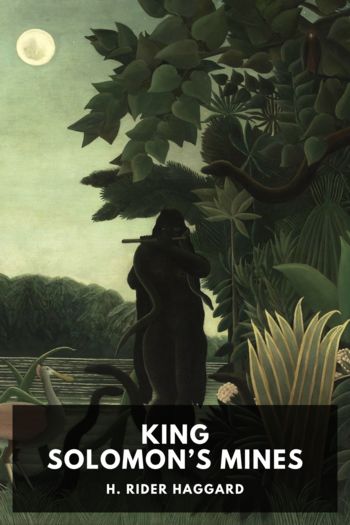The Two Confessions by John Whitbourn (speld decodable readers .TXT) 📗

- Author: John Whitbourn
Book online «The Two Confessions by John Whitbourn (speld decodable readers .TXT) 📗». Author John Whitbourn
Samuelrecalled reading that it was the Jesuits who'd taught the native 'Americans'shipbuilding, along with many other useful skills including the modern way ofwar. If so, they'd long outstripped their tutors, and not only survived butprospered. The Iroquois League, a vindication of the Papal 'nativisation'policy and by no means the least nation of expanding Christendom, now dealtwith the east coast colonies as equals.
Themariners certainly looked confident enough, though far from their home continent.They swarmed lithely over the rigging, securing the gaudy sails, or else packedthe deck, preparing to dock. For the moment they were in standard, practical,seaman gear, but on dry land they'd resume proper dress and the famous lonefeather for the traditional dance of thanks to the 'GreatSpirit-and-his-Christ-son' for safe deliverance. Only then would it beright to think about off-loading or stowing supplies for the return run - or anight on the town.
TheDevon dockers and merchants stood politely back awaiting the seemly time forbusiness. Only a few port-wives, recognising their lovers, broke the respectfulquiet to whoop hellos from the quay.
Apparently,the dance was quite a sight but Samuel had other calls on his time. He forcedhimself to forego that pleasure. The purpose of this walk was meant to be themarshalling of his thoughts, prior to another day of directed effort. He wasnot in Exeter to kill time or please himself, but to continue his crusadeagainst fate. There was no excuse for idle moments.
Samuelwas in the right place to frame no-nonsense thoughts. Few people came to Exeterand the West for frivolous reasons. It was a hard place and hard-working, wheregains were valued and held on to, or else shipped east for safekeeping. Back inthe previous century, 'United England' enthusiasts had come west tofight and conspire, but that struggle was now largely won and the movementbecome respectable and orthodox, even staid. The dwindling band of zealots whocame on pilgrimage to the famous 'Three Liberators' monument outside thewestern 'Kernow' gate now had all they wanted (save Scotland under itsunchallengeable Papal guarantee), and were as content as they'd ever be. Therealso arrived monastic orders and hermits and seekers-after-God attracted by thesparseness of settlement and many mortifications. Otherwise, visitors were alllike Samuel: passing through; out for what they could get.
Infact, he'd acquired a great deal during his stay in the city, though for thepresent without appreciating it. If his great objective remained elusive,there'd been other gains. Way back, in another life, he'd studied theantiquarian arts the better to endear himself to Mr Farncombe. Then, whatstarted as just a short cut to the man's daughter had grown into genuineinterest. He'd since devoured books with pleasure and actually worried away atthe mysteries of pre and post Flood days. In merely seeking to dupe FarncombeSamuel surprised himself with disinterested curiosity. Now, set loose amidst theLewes-dwarfing riches of Exeter learning, those forgotten feelings revived.
Whilstdrawing a blank about gold in Welcombe he'd been obliged to read about otherthings. If records of the old days said nothing about treasure there then hehad to weigh up the things they did say. Whereas to start with heskimmed impatiently though hard reading about matters dead and gone, soonenough he found he was paying proper attention. There was no strict call for himto line-by-line read some dry essay about ‘cromlechs’ and stone circles. Therewas certainly no reason for him to recollect it over dinner and wonder why andwhen men built them. He had no cause to lay awake in his lodgings and considerhow come there was only one known Roman villa in the far west. And asfor the question of the giant 'dragons' bones' that sometimes turned up incliff faces or rockfalls, what manner of creatures could they have been...?
Hispace of study slowed, its quality deepened, and though he should havecontrolled himself (as he did in everything else), he... chose not to.
There'dnever been a mine at Welcombe: he knew that much now: nor a castle or richpalace, or anything of that kind. There was no legend attached to the place hecould get his teeth - or spade - into, other than half-baked country-slownesstales about headless coachmen and hell-hounds. It seemed like the area hadalways been what it still was; not even a footnote in history.
Onthe other hand it did have the mossy and sweet-tasting well by theChurch, miraculously brought into life by St Nectan himself. Samuel had drunkfrom it on numerous occasions and spent an afternoon likewise absorbing a tomeabout that and all the other holy wells in the west.
Trevanrepented of it after, as though he'd been indulging in something shameful. Forpenance he hurtled through a vast pile of Bideford assize records, ignoringintriguing tales of blasphemy, heresy and sodomy, in vain search for fabulouswealth lost, hidden or stolen over Welcombe way. There were none – nor anythingeven like it.
Rightnow, the Library wasn't open yet, or leastways the psalms and pointless prayersthat started its day would still be going on. And, fine as it was, he didn'tcare to idle in the ancient Cathedral Green awaiting some priest's pleasure.There was ample time to stroll on, pitting himself against Exeter's steepclimbs and develop a fine headache chasing 'will she?/won't she?'enlightenment. For Trevan's problem was stubborn persistence in thinking theremust be some fresh approach to be found, if only he could batter his brainenough to see it.
Andyet... and yet, it was such a well-chewed bone there might actually be no meatleft on it. God knew (if he existed or cared) Samuel had gnawed away in searchlong enough. This wasn't like some child's jigsaw, or a wander in a maze, wherethere was certainty of a complete picture or a way out, even if you yourselfcouldn't find it. He'd been in the city – what? - a fortnight? Soon enough itwould be Lady Day, when





Comments (0)